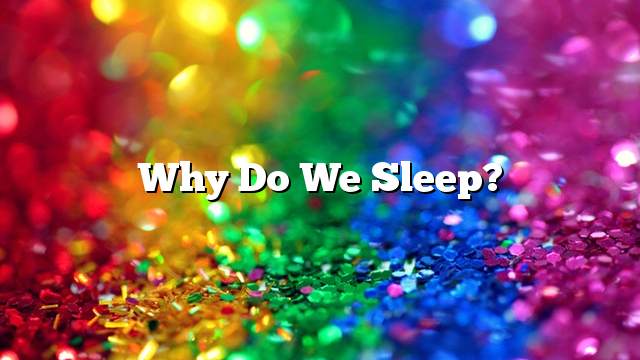Sleep takes about a third of your life to sleep (an average of eight hours a day). Sleep causes very complex physiological and chemical changes. The scientific outlook has changed from passive to passive to active. Over time, sleep has evolved into many Of diseases and disorders that affect the human during sleep, which not only affects the individual at night, but also to negatively affect his health and giving in the day.
However, the most important and deeper question remains, why do we sleep? What is the benefit of sleep? Why do we feel pleasure after having a quiet sleep? Why sleep deprivation is one of the most severe physical punishments? In short: What does sleep do to us? These are some of the questions that have been going on in the minds of scientists, especially since the beginning of the twentieth century, and accelerated in the past 30 years. Indeed, they did well in developing theories explaining the need for sleep, and tried to understand the function of sleep physiological and psychological. However, we have not yet reached a clearer and closer interpretation of sleep function in our lives.
In this light, we will shed light on some of the theories explaining the function of sleep, by simplifying science and language between, hoping to use our understanding of sleep to impose respect for this part of our lives and to give it its full right in the daily life cycle.
The first theory: That sleep to rest, so as to be vigilant active state of work, thinking, physical and mental production, so that sleep will rest for the body of daily fatigue, and to prepare him to continue the pursuit the next day. This view is supported by the observation of easy access to sleep after spending a busy day.
The second theory: Sleep is a necessity to repair the body and mind, depending on the individual and scientific observations that are confirmed when there is a chronic shortage of sleep hours. Studies have shown the association of low sleep hours with cardiovascular disease, diabetes, stroke and depression. In rats, it was observed that exposure to a few hours of sleep led to slower wound healing and premature death than those with normal sleep hours. But other studies have shown that the rate of cell division and protein building in the body increases in sleep than in vigilance.
The third theory: Sleep is necessary for the development of the brain and neural connections and learning centers, and this theory is important from several observations, including that the hours of sleep in children higher than in adults, allowing the child’s brain longer to grow and develop functionally. The study of people after exposure to short hours of sleep shows the low capacity of memory and focus and the ability to resolve issues, and that this negative effect disappears when the return to get sufficient hours of sleep. Other studies have shown that sleep stabilizes information obtained during wakefulness in the center of long-term memory in the brain.
The fourth theory: Sleep is necessary to conserve the energy of the body. It is mainly based on observing sleep synchronization with low body temperature, allowing the body to store stored energy and storing more of it. There is support for this theory in the approach of sleep to the state of winter hibernation in some mammals in order to save energy.
The fifth theory: That sleep is an entrance to dreams. It is one of the most widely studied theories of scientists. It is based on the fact that sleep is the only natural way to reach the stage of dreaming. It is the most complex stage in human life cycle in terms of its nature, function and difficulty in studying it and its ambiguity. While understanding dreams may lead to an understanding of the vehicle carrying him and I mean sleep, we will try to understand the dreams of an article in the coming weeks, .
Dr.. Louay Al Husseini
